|
This week our guest blogger takes a look at the vagaries of the English Language and how we ended up where we are. The views expressed in this blog are those of the blogger and don't necessarily represent the views of Selfishgenie Publishing.  One of my friends on Facebook, an Irish lady, posted this picture and asked an open question about who felt confident about the pronunciation of the product name (no, not Heinz - the other bit) . She was re-posting it from another Facebook page which is owned by an American on-line magazine. I was able to reply with the information that English place names that include the letters “cester” don’t actually pronounce the “ces” part, so the correct pronunciation is Wooster-sheer. The incorporation of “cester” into a place name means that it was founded by the Romans when they were in Britain and has its origins in “castra”, which is Latin for a camp. It is also the origin for place names that include “chester” as in Chester and Manchester. From that word we also get Doncaster and Lancaster. Incidentally, the “lan” part of Lancaster comes from the nearby River Lune (pronounced loon), but I’m guessing the people of the city didn’t fancy being known as the people from Looncaster.*  Chester - a city founded by the Romans Chester - a city founded by the Romans The pronunciation of Worcestershire is problematical for three reasons. Firstly, there is the pronunciation of Worc, It looks as though it should be pronounced as work, but the c in cester is soft, which makes the pronunciation worse, both literally and figuratively. I’m guessing the people of Worcester and its parent county didn’t fancy living in worse-tur, so the pronunciation shifted to woos. Secondly the “shire” part is pronounced sheer when it is quite clearly spelt to rhyme with hire. But that’s the English language for you, full of anomalies such as that one. I’ll return to that a little later. The final reason for this pronunciation being problematical, and pedants will already be penning their e-mails to tell me so, is that it is a sweeping generalisation and can’t be universally applied. What about “Cirencester”? They will ask. The “cester” in that is pronounced, otherwise it would be siren-stir and not siren-sester, like sister but spelt with an e. But anyway, Gloucestershire is pronounced gloss–tur-sheer, Leicestershire is less-tur-sheer, Towcester is toaster and Alcester is all-stir. 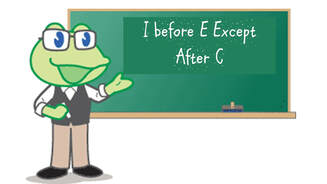 This is part of the problem with English. It isn’t consistent with the application of its own rules. Especially the English that is spoken in the United Kingdom. Take “I before e except after c”. I think there is sufficient evidence to allow us to draw a veil over that one. In fact, there are far more words that don’t obey the rule than there are words that do. The saying itself isn’t even complete. Ebenezer Cobham Brewer’s 1880 “Rules for English Spelling” gives it as “i before e, except after c, or when sounded as "a," as in neighbour and weigh.” But there is insufficient evidence to support that, either. Despite Cobham being English and never having visited America, the use of his rule in schools started in America, not Britain. But there you go, rules are meant to be broken (actually they aren’t, but that’s a whole different blog). But there are a lot of words we don’t know how to pronounce, or which some Smart Alec decides we are pronouncing wrongly and who change it. Take the name of the warrior queen Boadicea, for example. 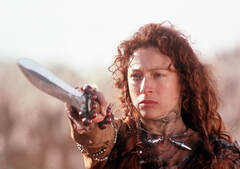 Actor Alex Kinston as Boadicea Actor Alex Kinston as Boadicea A long time ago, when I was growing up, she was universally referred to as Boadicea (Boa – d - seer). It is even engraved on her statue, which stands close to Westminster Bridge in London. In 1797 a British frigate was named HMS Boadicea, there was a passenger ship of the same name which was wrecked off the coast of Ireland in 1816 and there was a 1928 film entitled Boadicea. Yet somehow it was decided by someone that this was wrong and all of a sudden everyone started calling her Boudicca (Boo-dick-uh). Why and on what authority? I blame actor Alex Kingston, who starred in the TV drama Boudicca, Warrior Queen, in 2003. 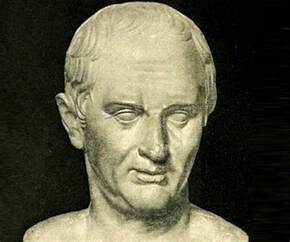 Roman historian Tacitus; AD56 to AD 120 Roman historian Tacitus; AD56 to AD 120 The only reason we know of this woman’s existence (that’s Boadicea, not Alex Kingston) is because of the Roman historian Tacitus, who recorded much of Rome’s history of the first century AD. However, he wasn’t born until AD 56 and never set foot in Britain. Given that Boadicea (I shall insist on using that name) died in AD 61, Tacitus would only have been 6 or 7 years old and could only have heard of the warrior queen second hand from his father, who had served in Britain 3 times, including during the rebellion for which she is famous. He would have heard about her in Latin, the Roman language and not the language of Britain, whose native people were Celts. It is from Tacitus that we get the spelling and pronunciation of Boadicea, not Boudicca. As the Celts didn’t have a written language at this time, we have no idea how her name would have been spelt or how the Celts would have pronounced it. So, it would appear, someone has taken it upon himself (or herself) to decide how the Celts would have pronounced it, with no regard for the lack of historical fact. They may look to Welsh, Scottish or Irish pronunciations, but that would be wrong, because those nations would have rendered the name into their languages from Latin as it was the only written source available. 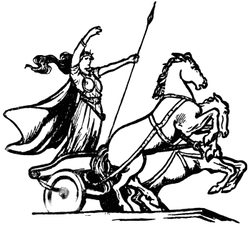 If you doubt this, then you have only to look at how Welsh and Gaelic speakers render modern words into their own language. The Welsh for “television” is teledu and the Irish is teilifís. Given that these words were created in modern times they could just have been accepted without translation, much as the French use l’weekend, but no, they had to be given a linguistic twist to make them “Celtic”. Could the same not have been done with the name of Boadicea? Is the use of the name Boudicca not just us pandering to first century Celtic chauvinism? Or maybe even to late 20th century Celtic chauvinism. What is my evidence for all that? She wasn’t actually a Queen at all so would not have been known widely outside of her own lands. She was the wife, and subsequently widow, of Prasutagus who was a client King of the Romans in an obscure and quite remote part of eastern England, a small part of the county we now call Norfolk. Her rebellion was short lived, lasting only a few weeks, and while she wrought havoc during that time she died ingloriously, crushed by the Roman legions. She wouldn’t have been admired, even by her own people, after that defeat. In fact, given the reprisals visited on the natives by the Romans after the rebellion, it is more likely that her name would have been more cursed than celebrated. As I said, the only reason we know about her at all is because of a Roman historian who wrote her name in Latin and it was Boadicea. 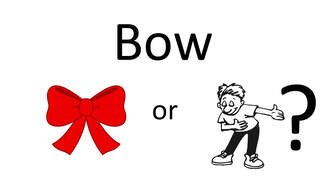 But back to words and their pronunciation. How do you pronounce “bow”? If you have thought about it you will have come up with two different pronunciations. Pronunciation (1) rhymes with “go” and pronunciation (2) rhymes with “cow”. You only know which is correct when you put other words alongside it to make it clear which bow you are talking about. So, you would need to know that the mother tied the ribbon into a pretty bow for her daughter’s hair, or that the man bent over in a deep bow of respect for the king. English is almost unique in having words that can be both nouns and verbs, depending on how we use them. No other language does that. This is why we get a noun such as bow, which can mean a knot or a weapon, and also a verb, to bow. We also have run, which is a verb and also a noun – a place for running as in chicken run and walk, a verb which means to move at a particular pace but which can also be a noun – a good walk. There are many others. How do we teach this to our children? Actually we don’t. They appear to learn it for themselves. No one is sure how, but they seem to pick it up instinctively. However, in many ways English is also a simple language. Take the definite article “the” as in the chair, the table etc. That’s it. That’s all we have. It’s gender neutral and doesn’t change between the subject and object of a sentence. German has der, die, das, den and dem for the same thing and the French have le, la and les and also, frequently, l’. In German there are 7 different versions of “you” depending on gender and familiarity with the person being addressed. The French have at least 2, tu and vous (I’m not a linguist so I am happy to be corrected on that). The Japanese have 7 forms of “thank you” starting with the simple arigato and moving up though levels of formality until the speaker is lying prostrate, face down on the ground. Just joking, but it isn’t far from the truth. The Japanese language is very big on formality, as are many others. English, however, seems to be much less worried about formality these days. 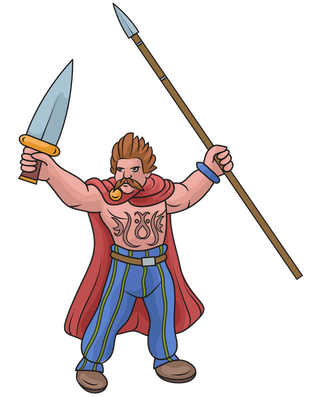 Much of this is because our language isn’t pure. 2,000 years ago the residents of these islands would all have spoken the Celtic language(s), because the Romans’ only successful invasion wasn’t until AD42 (get ready for a big anniversary party in 20 years’ time). But they wouldn’t all have spoken in the same dialect. We know this because Welsh, one of the ancient Celtic languages, is different from Gaelic, which is spoken in both Scotland and Ireland but has differences even between them. They are all different from Manx, spoken on the Isle of Man., Then there’s Cornish and Breton. It wasn’t really the Romans that brought us Latin, it was more to do with the clergy, who used Latin to communicate between themselves and taught it to the children of the aristocracy and the wealthy, who also used it as a way of communicating with their peers throughout Europe. Many of our words have a Latin origin, even though a lot of them came via other European languages. European philosophers loved the Ancient Greeks and quite a lot of our words have their language as their origin because of that, especially those relating to medicine and science. 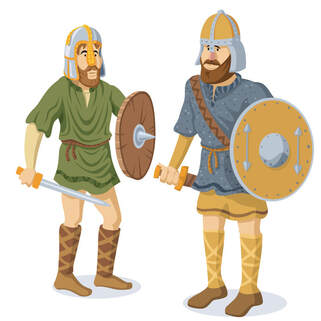 About 1,500 years ago our ancestors started to speak Anglo-Saxon, brought with us (or perhaps to us, depending on your ancestry) by the invaders who filled the power vacuum created when the Romans went home. This is still the basis for our language but only scholars of mediaeval languages would be able to understand what a Saxon warrior was saying, were one to rise from the dead in today’s Britain. Mixed in with our Anglo-Saxon is Norse, brought to us by the Danes and Norwegians between 1,300 to 1,000 years ago, then sprinkle in some Norman French which arrived 950 years ago. Thanks to the Plantagenet’s we get more French, the real thing, which was brought in about 850 years ago and from that recipe the language we now call English began to emerge about 700 years ago. English wasn’t even the official language of the Royal Court until the time of Richard II, who died in 1400 (Trivia - he also introduced the fork into England as an implement of cutlery). With a bit of difficulty, we would be able to understand the dying words of Watt Tyler, the leader of the Peasants’ Revolt, who died in 1381. As he was beheaded his last word was probably “argh”, but you get the idea. 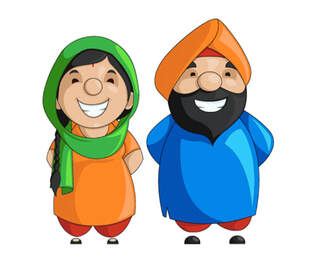 The eastern influence The eastern influence Even though English was a fully formed language by the 1500s, it didn’t stop changing even after that. In the 19th century we started to adopt words from much further east. If you are in the habit of wearing pyjamas when you are in your bungalow, you are using two words that have their roots in India. From that it is unsurprising that so much of our language is confusing. Each new addition brought new words, new ways of saying things and new ways of spelling, much of which wasn’t written down because the Anglo-Saxons and the Danes didn’t have a written language at the time of their arrival. It was monks who wrote things down and they did it in Latin, not Anglo-Saxon. When the monks started to create a written version of the common languages they had to invent new letters, such as æ because there was no equivalent sound in Latin. They even had to invent the letters J and W because these weren’t in the original Latin alphabet. That’s right; You couldn’t go to a J D Wetherspoon’s pub in early Anglo Saxon times, it would have been I D Utherspoon’s. 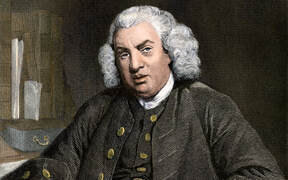 The grumpy looking Dr Samuel Johnson (1709-1784) The grumpy looking Dr Samuel Johnson (1709-1784) In fact English spelling as we know it didn’t come in until Samuel Johnson published the first English dictionary in 1755. Up until then people spelt things pretty much as they felt like it; even their own names. There are, allegedly, at least three different versions of the spelling of Shakespeare’s name, all in his own handwriting (scholars now dispute this, but they always did like to spoil a good story). Even after the publication of Johnson’s dictionary it took some time for spelling to become standardised and to take on their modern forms. American spelling didn’t start to be standardised until 1828 when Noah Webster published his “American Dictionary of the English Language”. This is the one that led to the Americans starting to leave the u out of words like colour and to put z where it had always been perfectly adequate for an s to be. Webster felt it necessary to try to simplify the language for the benefit of the wide variety of immigrants who were arriving in their droves from Europe. 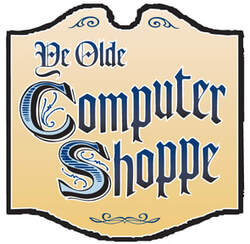 Just a note for my American readers (and many British too, because they make the same mistake). When you see a sign like this one it isn’t pronounced Yee Oldee. The Y isn’t a Y, it is an obsolete letter called a thorne and is pronounced th. Also, you don’t pronounce the e in Olde (or shoppe for that matter). So, it’s just plain “The Old”. Boring, I know. Robert Burchfield, who edited the Oxford English Dictionary for 30 years up until 1986, once caused quite a stir by saying that the British and American forms of English were drifting apart so rapidly that in 200 years’ time it was possible that we would no longer be able to understand one another. However, he was speaking in the pre-internet age (remember that?) and I think it is far more likely that we will soon all be speaking American English. Already I’m being bullied by software that provides an annoying red wiggly line under anything that it thinks should have a z in it when I think it should be an s, or when I spell “colour” with a u. How long before the weaker willed amongst us start to give in to this automated intimidation? Anyway, here’s one person who is happy to educate Americans on how to pronounce Worcestershire and who will always spell colour with a u. * The words “loon” and “lunatic” are derived from the French “la lune” meaning the moon and allude to the alleged strange behaviour of some people and animals at the time of the full moon. If you enjoyed this blog or found it informative, be sure not to miss future editions by signing up to our newsletter. Just click on the button below and we'll even send you an ebook of your choice for doing it. Would you like to be a guest blogger for Selfishgenie Publishing? Just email us with an outline of your blog. And you can also have a free ebook if we use your submission. Our email address is e[email protected]
1 Comment
Once again we turn our blog page over to a guest blogger. The views expressed are those of the blog's author and don't necessarily represent the views of Selfishgenie Publishing 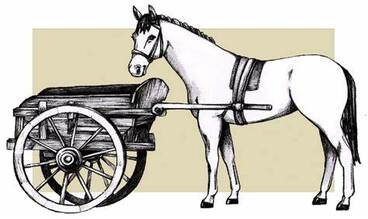 Have you noticed how books are all starting to conform to a pattern these days? After reading the start of a few books quite recently I rejected them, but it was only after I rejected them that I started to realise that the reason I rejected them was because they weren’t conforming to the pattern. Therefore, I wasn’t prepared to carry on reading them. Which was most unfair on the authors who had invested so much time in writing them. So, what is the pattern? It’s the habit many authors now have of hitting the reader between the eyes on page one of the book, with some sort of action scene, before dialling down the action to properly introduce the characters and develop the plot. They then pick up where the action left off and continue the story in a more linear fashion. I have to plead guilty with regards to my own books. It doesn’t just apply to books that are action focused. Romances, too, sometimes start in the middle before returning to the beginning. So, has this always been the way books were written? Going back deep into history, to the start of my own reading, I remember that stories happened in a predictable order. There was the beginning, where the characters were introduced and the starting point of the story was established, then a middle, where the plot was developed, then an end, where the climax was reached and everyone lived happily ever after. This allowed the author to develop their characters before launching them into their adventures. Who could imagine “Pride and Prejudice” being a success if we didn’t know all about Elizabeth Bennet’s personality from the very start. 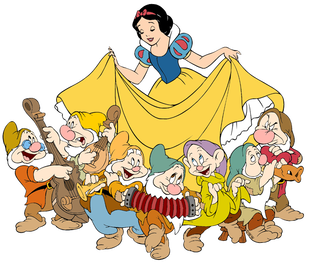 If you think about the fairy stories of childhood, they always conformed to the beginning, middle and end pattern. We don’t first encounter Snow White breaking into the Seven Dwarves’ house, then go back to find out that she was sent out with the huntsman to be murdered on the orders of her wicked stepmother. Similarly, we don’t first encounter Cinderella running away from the ball, losing her glass slipper on the way, then go back to the kitchen to find out she is being bullied by her wicked stepmother and the ugly sisters.. Of course, those stories are for children and a child’s unsophisticated mind couldn’t follow a story told any other way. But what we learn as children tends to stay with us for life. As we grow up the stories still follow the beginning, middle and end paradigm until we reach adulthood. Then mayhem ensues. 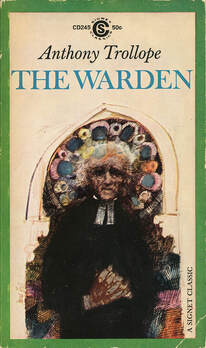 The problem with this traditional style of storytelling, of course, is that it takes time to introduce characters, explain who they are and what they are doing. I remember having been bored silly by “The Warden”, a novel by Anthony Trollope and considered to be a classic. The reason I was trying to read it was because it was a set book for my English exams and I was supposed to be learning how to use language and how to tell a story properly. Today Trollope’s book might never find a publisher, because it takes so long to get going (no great loss if you ask me). The same could be said of many other books that are regarded as classics. So why this change in the approach to storytelling? Well, literary agents are partly to blame (or are they?). When an author wishes to submit a book to an agent in order to try to get a publishing deal, the first thing they do is go onto the agent’s website and read the submission guidelines. These are invariably the same. Submit no more than the first 10,000 words or the first 3 chapters. If the agent likes what they read, they will ask for more. If not, they won’t. Even when it comes to publishers who accept submissions direct from authors, the word limit is usually still applied.  So that’s it guys and gals. If you can’t grab the agent’s attention in those 10,000 or so words your book will be rejected. So, in order to deal with that the author tries to inject some action into the first thousand words in the hope that the agent reads on. The result is that the middle of the book, or at least part of it, gets stuck in before the beginning. However, is it really the agent’s fault? After all, isn’t the author making a rather large assumption about what the agent wants to read and is tailoring their book on the basis of that assumption. Maybe the agent actually wants to see how the characters are developed and how the plot unfolds. Maybe that is why so many authors receive rejection letters. Maybe we are making our submissions based on false assumptions. If you are an agent or publisher reading this, perhaps you’d like to comment. 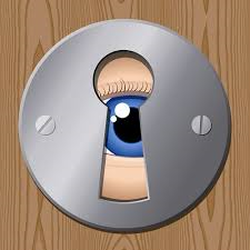 Then there is Amazon. Their “look inside” feature gives the purchaser the opportunity to read a couple of thousand words of a book before they purchase it. This is to match the experience of the “browser”; the reader in the bookshop or library who has the time to spare to actually read the first few pages of the book before they decide whether or not to borrow or buy it. So, again, the author may set out to grab the reader’s attention so that they don’t put the book back down again. But again are we, the authors, usurping the process by making the assumption that the reader won’t borrow or buy our book if we don’t hit them between the eyes on the very first page. It is said that the first line of a book must be an attention grabber. That’s fair enough, but that doesn’t mean that the author then has to launch into climactic action before the reader even knows who the characters are. 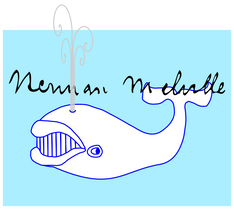 As part of the research for this blog (yes, I do research) I read the ‘look inside’ portion of Herman Melville’s “Moby Dick”. This, of course, is reckoned to be another classic. But based on what I read, I wouldn’t buy it. To be sure, Melville’s use of language is beautiful, but in the opening pages of the book not a lot happens. The reader isn’t even told that a whale is involved. We don't even find out who Ishmael is or what he has to do with the story (not a lot, as it turns out). So, is it therefore not the reader’s fault that the whole nature of storytelling has changed? We expect instant gratification. We want the action to start on Page One, and if it doesn’t we put the book down and move on. 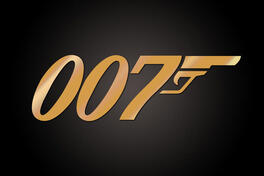 Thinking about this made me think about films (movies) and the way they now tell their stories. We are used to James Bond films, for example, where Bond is always in mortal combat with an enemy in the opening scenes of the film, well before the title music starts up. Other films also use this technique. So, maybe, in our minds, we have started to think that is how our stories should be told. We, too, are putting the action in before the metaphorical title music. So, when an author goes back to the traditional beginning, middle and end format for writing, we think it a little bit odd. Is this what guided my decisions to reject certain books? Or is it just me? I may have been rejecting masterpieces, simply because I didn’t have the patience to let the author tell the story properly. I have had the same conversation with my wife when new TV dramas start up. It’s a bit boring, she’ll say, and my reply will be that we have to establish who everyone is first and how they connect together. 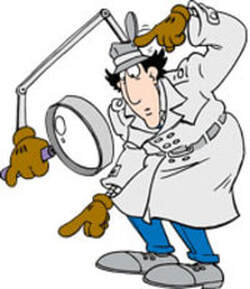 Again, thinking of TV crime shows in particular, they often open up with a dead body and it takes the rest of the story to find out who the dead person really was, and all their little quirks and foibles which led them to being bumped off. Along the way we also find out about the police officers who are investigating the death, but not until after the body is found. Would I still watch the programme if it unfolded any other way? I can hardly complain that a character is underdeveloped if I won’t give the author time to develop him or her. I can’t complain about the plot being difficult to follow if I don’t give the author time to explain what is happening. This is particularly so when it comes to back story. It is like trying to tell the story of World War II without first telling the reader who the Nazis were. Will I be changing the way I write my own stories as a result of what I have deduced? I don’t know. I rather like hitting the reader between the eyes on Page One. I don’t do it in every book I have written, but I have to admit to doing it in the majority of them. Judge for yourselves whether it is the right technique. Just click on the “books” tab at the top of this page to find out more. If you enjoyed this blog, or found it informative, be sure not miss future editions by signing up for our newsletter. Just click on the button below. We'll even let you choose a FREE ebook for doing it. Do you fancy being a guest blogger for Selfishgenie Publishing? Just email us and tell us what you would like to blog about. Find our email address on our "Contact" page.
Once again we are turning our blog page over to a guest blogger. All the views expressed in this blog are those of the blogger and are not necessarily representative of the views of Selfishgenie Publishing. 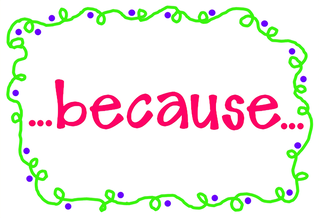 Why do it? Why put yourself through all the trials and tribulations of writing a novel, searching for an agent, then possibly having to do all the work to self-publish if you can’t attract an agent? I have applied some thought to this and have come up with the following list of reasons. It isn’t exhaustive, so please feel free to add your own suggestions in the comments below the blog. 1. You like writing. I know that this sounds obvious, but I have actually met authors who have told me that they love being an author but hate all the writing that goes with it. Sorry, that will never work out. You can test yourself on this. If, suddenly, an hour of your time were to come free, which would you rather do (A) watch something on TV or (B) sit down and try to write something. If the answer isn’t (B) then you are never going to be an author. 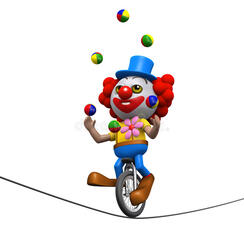 2. You have a genuine talent. When you first decide to write you may not know if you have the talent for it or not. Even when you have written your first book and shown it to friends and family you still can’t be sure, because friends and family often want to be kind and so they say kind things about your work. But if you do have a talent then it is vital to express it, or frustration is the only possible outcome. The first review on Amazon (other book selling sites are available) that is submitted by a stranger will tell you if you have a talent or not. But there are two different forms of talent that make a good author. The first is a talent for story telling – and it doesn’t have to manifest itself in the written form. If you are the sort of person who is able to make up stories for the entertainment of others, you have this talent and you are halfway to becoming a successful author. The second talent is the actual writing part. Being able to construct sentences that grab the reader’s attention and provide them with the emotional input they crave. Being literate in the grammatical sense helps, but that can be sorted out by a proof reader or editor. 3. You love reading. Reading and writing go hand in hand. All real authors start off as avid readers. The best books inspire us to have a go, while the worst books inspire us to try to do better ourselves. 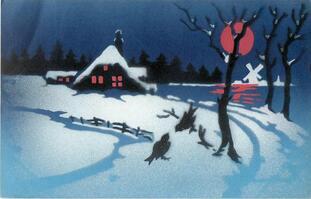 4. You live somewhere where there are harsh winters. I’m serious. It’s far easier to sit indoors and write a thousand words if the sun isn’t shining outside. Even small outdoor distractions, such as tidying the garden, get in the way of writing. If you live in the sort of latitudes where it is dark for 18 hours out of 24 (or even longer) then so much the better. 5. You have something you want to say. We all have opinions, but some have stronger feelings about things than others. Writing them down in the form of a novel allows you to imbue your character with your opinions while also telling a story. However, there is a downside to this. You may be alienating all those potential readers who disagree with your opinions. While you may believe that you are right, they have the right to disagree with you. 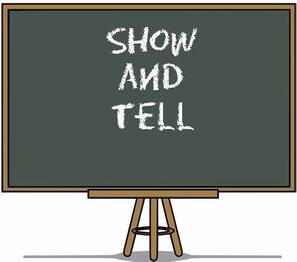 6. You want to expose something that needs exposing. Making an issue part of your plot allows you to expose a problem or a scandal. If your readers are intelligent (they probably are, otherwise they wouldn’t be reading books, they’d be playing computer games) they will see where the fiction ends and where the reality starts. You can often reach a far larger audience with a novel than with a polemic. To Kill A Mockingbird did far more to expose racism in the USA than any number of learned treatises. 7. You want to entertain people. We can’t all sing or dance or play the piano, but if you can write a decent story, you can be an entertainer. Story telling as a form of entertainment goes back far further in history than music or dance. 8. You have to get the stories out of your head. So many good ideas for stories, but they are no good stuck inside your head. They just nag and nag at you. So, tell the stories and stop them nagging you. 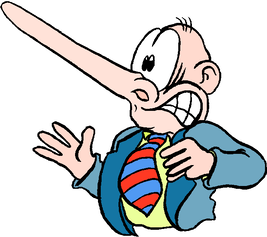 9. It’s cathartic. Expressing yourself artistically (yes, that’s what authors are doing) makes you feel better. Getting your demons out of your head and onto the paper prevents them from praying on your mind and threatening your sanity. 10. You like telling lies. Authors tell lies for a living. The best of them are able to make you believe their lies so well that they can transport you to a whole world that they have created out of their lies. Tolkein, Pratchett, Douglas Adam, Richard Adams, the list goes on but the one thing these greats have in common is that their worlds didn’t exist, but they made us believe in them anyway. They could sell snow to an Eskimo. And One Reason Why You Shouldn’t Become An Author. 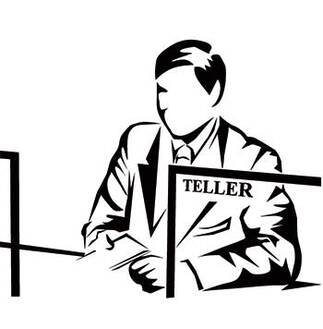 1. You want to make lots of money. Sadly, you probably won’t. Even if you sell quite a lot of copies, your publisher, agent, printer, retail outlet etc will all take a cut. Typically the author only gets about 10% of the gross income from sales and then the Inland Revenue want a cut of that. For a £9.99 paperback ($11.50 approx) the author won’t get much more than 80 pence. To make the top 100 best seller lists you have to sell at least 100,000 copies, which means the author might get £80,000 before tax. But the majority of authors, probably 90% of them, will never sell more than 1,000 copes, so earnings expectations are very low. According to The Guardian most authors make less than £600 a year. Given that you have probably invested about 1,000 hours in writing your book, that isn’t a very good return. It’s certainly below the hourly rate for the so-called Living Wage. A meagre 1.7% of traditionally published authors and 0.7% of self-published authors make in excess of £70,000 ($100,000 approx). The article is a bit old now, but the fundamentals of publishing haven’t changed since it was written. The big money from books comes from film and TV rights. If your book attracts that attention then the sky is the limit, but again, that won’t happen for about 90% of authors.  How many authors are out there writing away and how many of them will hit the big time? Well, accurate figures aren’t available because most data is based on sales and if no sales are forthcoming you won’t be counted. Then there are the thousands of authors who are still working away in the bedrooms, kitchens or sheds to complete their first manuscript and can’t be counted because they haven’t yet broken cover. But put it this way, over a million books are uploaded onto Amazon each year, the vast majority by by self-published authors and then you have to add on those that are published by small, on-line publishers. Whereas the total output of the big publishing houses, who dominate the market, is between 1,000 and 2,000 books per year of all types (UK figures). Even with the backing and marketing budget of a major publishing house most of those books will sell less than the magic 100,000 copies needed to make it onto a best seller list. In Susanne Collins’s The Hunger Games the supporters always say to the combatants, “may the odds always be in your favour”. The truth is that in book publishing, the odds are always stacked against success. 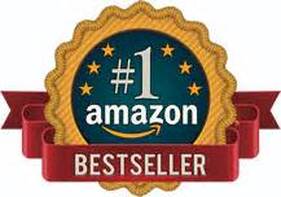 Ignore all those claims made by some authors of being “Number 1” on Amazon’s best seller list for such-and-such a category. The way Amazon works you can make it to number one with the sale of half a dozen copies in a day, even less in some obscure categories. You’ll only be there for a day, perhaps even for an hour, but that’s long enough to do a “screen save” to share on Facebook or Twitter. if you doubt me, re-read Reason 10 above. Many writers will never make anything from the sale of their books. That doesn’t mean that they are bad books. How would anyone know if they haven’t read a copy? No, the authors don’t make any money because readers like to stick with the tried and tested. They may read a book that is recommended to them by a friend or relative, but they don’t often go seeking out new authors for themselves. The friend or relative probably bought their copy because it was reviewed in a newspaper or magazine, channels that are securely stitched up by the big publishers. Hey – who said that the world was fair? Show me the contract! That is why authors are always asking for reviews. So if you, as a reader, do find a new author and, if you like their book, please consider sharing your discovery by writing a review. So, if you are going to become an author, do it for the love of writing because it is probably the only reward you will ever get. And for those very few of you who will one day hit the big time – don’t forget the little people! If you have enjoyed this blog and you want to be sure of not missing the next one, just sign up for our newsletter. We promise not to spam you and we'll even let you choose a free ebook for doing it. Just click on the button below. And if you would like to be a guest blogger for us, just send us your blog idea. You can find our email address here.
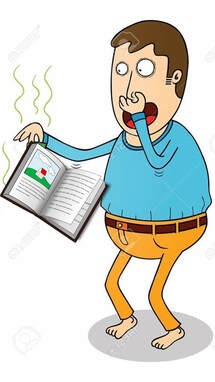 A while ago, in this very blog, I made an offer to review books for other authors. It was intended as an act of solidarity to undermine the leaches that are preying on the writing community by offering dubious quality services in exchange for even more dubious quality benefits - and all at a price. I should have thought it through a little bit more. It isn’t the work involved. If I was worried about that I would never have made the offer in the first place. No, it is that there are so very many poorly written books out there and when you make an offer to review books you have to read them first. The problem is quantity versus quality. There are more people writing books today than ever before. When Covid struck (and a recession earlier in the century), writing a book would seem like good way to generate a new income. The cost of entry into the market is as low as the price of a pencil and a notepad, though a computer of some sort makes life much easier. The truth is that very few authors make enough money to live on, but very few of these new authors would actually know that. 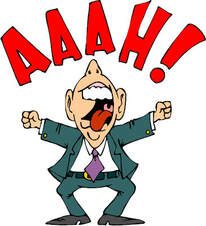 When satellite, cable and free to air digital TV came along I made a personal prediction that the quantity it offered would come at the cost of quality. It is a prediction that came true. While there are good quality programmes on some channels, once you get away from the big name providers you are into a world of repeats, reality TV and pseudo reality. Most of it fits neatly under the heading of "junk TV". The same applies to writing. Quantity comes at the expense of quality. Anyone who can write 80,000 words (it is frequently a lot less) can click on the “upload” button on Amazon, Smashwords, Kobo, Lulu et al and hey presto, they’re a published author. Now, don’t get me wrong. I have read a lot of very good books by Indie authors and those published by small, online publishing houses. I’ve even reviewed some of them in this blog. They deserve better than the publishing industry gives, simply because the big publishers, hand in glove with literary agents, have such a strangle hold on the industry, which means that the majority of authors never have a fighting chance of hitting the big time.  No, the problem is that so many people think that they can write a book when, really, they can’t. Before I go any further, I’m not going to mention any authors or book titles by name. It isn’t fair that I damage their prospects for sales by bad mouthing them in a blog. I’m not a big believer in karma, but I also don’t want to run the risk of retaliation. Let's face it, when it comes to sabotage, these authors have done such a great job themselves. I’m not talking about the “nearly” books that a half decent editor could help the author to lick into shape. The underlying talent in those books shines through and as an author myself I’m willing to tolerate the sentences that don’t quite come across as well as they might, the bit of dialogue that is a little bit clunky or the loose end in the plot that isn’t quite tidied away. All authors know we would write those books differently, but the point is that they aren’t our books, so the author has the right to tell their story the way they want. 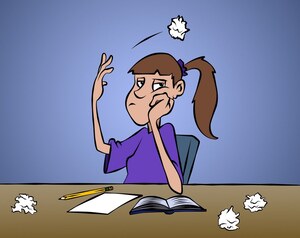 What I’m talking about is the book that should never have been written in the first place. The “it seemed like a good idea at the time” books that had no chance of ever making it to a satisfactory ending. These are the books filled with characters that are so badly written that to describe them as one dimensional is to ascribe one dimension too many. The books so lacking in emotion that you would think that the world was filled with emotionless robots rather than with real people. It is the latter which bothers me the most. Readers engage with characters they care about. They will want to read about them. They will want to turn the page to find out if they succeed or fail, love or lose, live or die. Readers care about them because they can identify with them and they identify with them because they understand them. So why couldn’t I identify with any of the characters in these poor novels? Basically it was because the authors told me so little about the characters. Oh, we get plenty of physical descriptions, to be sure. I was also given plenty of plot to read about, some of which was inventive, but much of which had been done before. To make me want to read on, I needed something to care about, and wasn’t given it. I ended up questioning my reason for reading the books. Why should I care about these characters? I don’t know them; I feel nothing for them. 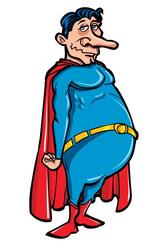 OK, they may be dangling above a fiery pit, just about to get burnt to a crisp, but do I care? Not really. The authors gave me no reason to care. They are just names on a bit of paper (or letters on the screen of an e-reader). They mean nothing to me because the authors haven’t told me anything about them to make me care. Like the guy on the left, they're just a caricature. When I think back over all the books I have ever read that I really enjoyed, the common factor is that they had strong protagonists. I don’t mean strong in the “wading through fire to rescue the damsel in distress” type of strong. I mean emotionally strong. Their authors made me feel every pang of emotion that you would expect a real person to feel. This is what worries me about the authors who are writing such poor books. Are they not people too? Do they not love? Do they not feel fear? Do they not feel happy or sad? To read their books you would think that the answer was a resounding “no”. If someone can’t write about emotions then I would suggest that they shouldn’t be an author, because to be an author you have to live with emotion every time you sit down to write. I don’t know about other authors, but when I stop writing at the end of the day I sometimes feel as though I’ve been through an emotional mangle; crushed and wrung out. If I can’t make myself laugh or cry then how am I ever going to make my readers laugh or cry? If I can’t make myself worry about what will happen to my characters, how can I expect my readers to worry about them? 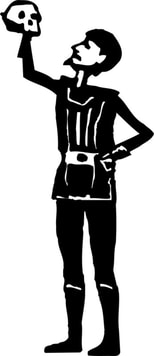 Another problem that I have encountered in recent books is a lack of drama. Drama comes from conflict and if there isn’t any conflict in the story there will never be a story worth reading. Even romantic stories have a conflict at their heart. It is the conflict that prevents the romantically entwined characters from being happy together, at least not until they have resolved the conflict so that they can live happily ever after. This means that the characters must have something meaningful happen to them early in the story. Something that will expose their emotional state and tell me who they are, deep down inside. I have to say that some of the books I refer to have garnered 5 star reviews on Amazon and Goodreads, which is rather worrying. Either the readers who posted those reviews are less critical than me, or the reviews aren’t genuine. I am well aware that not every reader will enjoy every book to the same degree. One person’s 5 star read may be another reader’s 4 or even 3 star. But I can’t believe that 20 or 30 people gave 5 stars to the book I would struggle to award 1 star. It defies logic. I think the problem for some authors is the market testing of their books. They ask friends or family to read them, rather than asking for criticism from somebody independent. However well-read friends and family may be, at heart they want to be seen to be supportive of the author, so they say nice things about the book even if it hasn’t got many redeeming features. Consequently, the author gets a false sense of the real quality of their work and they publish based on that. They may get away with it once and sell a few copies, but no one will be returning to read the sequel. In the meantime, if you have written a book that you think is better than the ones I have talked about above, I’d be happy to review it for you. I really, really would like to be able to post a 4 or 5 star review for someone. And if you think I’m an arrogant know-it-all who wouldn’t recognise a good book if it jumped up and bit me on the nose, then you can say as much when you read one of my books and post a review of it. You can find out more about my books by clicking on the “Books” tab at the top of this page. If you have enjoyed this blog, or found it informative, then be sure not to miss the next edition. Sign up for our newsletter by clicking the button below. We'll even send you a free ebook if you do.  How long should a book be if the author wants it to sell? I had better state up front that I’m not going to attempt to actually provide a definitive answer to the question I have posed. I’m entering into what might be regarded as a philosophical discussion on the subject and any views I express are merely opinions. But it is quite an important question because the answers, right or wrong, may strongly influence whether or not a reader actually purchases a book. If you use Google to try to find the answer you’ll get various opinions. But, generally, a novel is expected to be between 80,000 and 120,000 words. This is based on hard copy books, of course. Less than 80,000 words and it’s going to look pretty malnourished sitting on the bookshelf in W H Smiths (or Barnes and Noble) alongside its fatter neighbours. Size gives an impression of value for money, even if it is no guarantee of quality of writing. 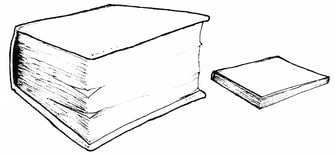 Once you get over 120,000 words, however, the publisher has a different problem. Paper costs money and profits will be reduced if publishers have to spend more money on paper but still have to charge the same price for the book in order to remain competitive. Most books sell at the same retail price regardless of size; about £18.99 (call it $20) for a hardback book and £9.99 for a paperback. Those prices are for bestselling authors, of course. Kindle books can run from 99p right through to marginally less than the price of a paperback, depending on how famous the author is. There is also a psychological factor. A thick book looks challenging. Maybe it’s so thick because the author has used a lot of big words. Maybe it will take too long to read and I’ll get bored with it. Maybe it’s so long because it’s very complex and I don’t want to spend a lot of time unravelling a complicated plot. Who knows what people might think when faced with a thick book! 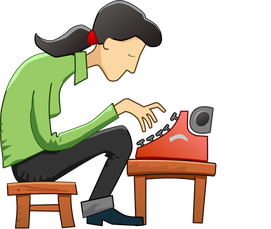 While it would be nice to think that readers buy books solely based on the quality of the writing there has to be other factors involved. It can be the only explanation for some of the dross that makes it into best seller lists alongside much better written books and why some very good books never make it. For example, let’s say that a new author publishes their very first book. None of the reading public will ever have seen the author’s name before and can’t have read any of the author’s work, so how will they decide whether or not to buy the book? There is no doubt that marketing plays a big part in this. If the author is published by a major publishing house the publisher will put a lot of money into getting the name of the book out there in front of the reading public. Adverts have to be paid for; review copies have to be sent to newspapers, magazines, radio and TV stations etc. Authors are sent on book signing tours etc.  Best selling "author" Katie Price Best selling "author" Katie Price Based on the marketing blurb, readers may take a chance and shell out some of their hard earned, but in effect they are buying the publisher, not the book. And it works; Katie Price has sold a lot of very poor-quality books. Well, her ghost writers have anyway; she just gets the lion’s share of the royalties. But that doesn’t account for why some books released by smaller publishing houses, or even self-published books, also make it into best seller lists despite the minuscule amount of money spent on marketing them. The readers’ decision won’t be based on the quality of the author’s writing because, with a first book, they can’t have read any previous work on which to base that decision. It is also unlikely to be based solely on the few pages that Amazon allows the potential buyer to read using their “look inside” feature. As both a reader and an editor I know that a promising first few pages doesn’t necessarily lead to 300 good pages. Many authors, even quite well-established ones, are unable to maintain their writing quality for that long and some start to stumble after just 20 or 30 pages. By 50 pages I’ve already binned the book and gone looking for something better written.  Some Indie authors will already be aware of this phenomenon. Having submitted an extract as per an agent’s submission guidelines, they get a request for the full MS. They are elated, naturally, but then brought down to Earth with a bump when the full MS gets rejected. Learn from that – because what the agent is effectively saying is that you couldn’t maintain a consistent quality of writing for a full-length book. So, if the decision isn’t going to be based on the quality of the writing, what is it going to be based on? You would think that price might have something to do with the decision, but it doesn’t appear to do so. When it comes to the price of books we live in a strange world. A pint of beer costs around £4 and a large glass of wine (is there any other sort?) over £5. A self-published e-book, however, will retail for anywhere between 99p and £5 depending on the author’s knowledge of pricing strategies and their vanity. Now, which is going to last longer and offers more potential for enjoyment, the pint of beer/glass of wine or the book?  Well, let me put it this way. In my experience, after 6 months I find it easier to recall a good book (or even a bad book) than I do to recall the qualities of a specific pint of beer or a specific glass of wine. There is another factor involved here as well. If I really enjoy a book, I may go back a few months or years later and read the same book a second time. I’ve read Lord Of The Rings far more times than is healthy for a grown man. But I can’t go back and enjoy the same pint of beer or glass of wine again, not for free anyway – I have to buy another one and, thanks to inflation, it will cost more. So, if people won’t shell out the paltry sum of 99p to read an author’s first book what other factors are there? 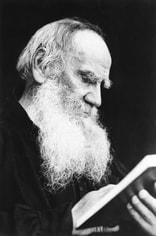 Leo Tolstoy Leo Tolstoy I go back to my argument about the word count. Is the reader truly getting value for money, or will they feel intimidated by the “thickness” of it? War and Peace is about 590,000 words long. When Tolstoy first had it published it was released in 4 volumes and a 2 part epilogue. If you want to buy a modern copy it would be more likely to be published as a single volume. In value for money terms you would think that it would be flying off the bookshelves, but it isn’t. Why not? It’s an acknowledged masterpiece after all. Well, perhaps people feel intimidated by its size. Let’s look at a more modestly sized classic, also by Tolstoy: Anna Karenina. Not many sales for that these days though it is perhaps one of the greatest romantic stories ever told. Length? 350,000 words. Hardly lightweight. Remember, I am also talking about e-books here, where you can’t “see” or feel the thickness of the book. 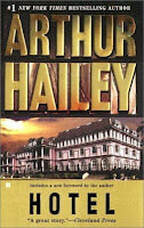 But you can. Because Amazon helpfully tells you, as part of their product description, how many pages long the book is As a guide, 80,000 words gives you a paperback book of about 290 pages, so 120,000 words would be about 435, big enough to qualify as a “blockbuster” in the Arthur Hailey mould. The sort of book that will not only last you for a whole holiday, but also for the cancellation of your flight due to a volcanic eruption and a 24 hour rail strike when you get back to the UK. The Kindle version of Arthur Hailey’s “Hotel” is actually 485 pages long. Perhaps that’s why he rarely features in the best seller lists any more. That and the fact that he died in 2004. 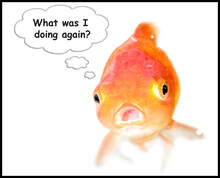 The sad truth is that the attention span of some readers isn’t that great. They’ll read 300 pages but 301 will defeat them. That presents the author with something of a problem. Do you disregard those readers and concentrate on those that will stay the course, in which case you are placing an artificial ceiling on your sales volume. Or do you take another course of action? Maybe you do what many authors are doing these days and write your books as a series; telling the story in 300 page chunks. You wouldn’t be the first: remember Tolstoy and War and Peace? It’s now common practice and one I have adopted for 2 separate series I have written. There can be no doubt that the margins for success for the new author are very narrow and seemingly quite arbitrary. It therefore makes sense, to me at least, not to do anything that might put the potential reader off buying a book and that includes thinking about exactly how long the book should be. Let’s face it, the average story could be told on a single page of A4, yet we expect a bit more than that. So the book should be neither too short (poor value for money) nor too long (too “weighty”). For me that means between 80 and 90,000 words. It’s entirely up to other authors where they draw their lines. If you have enjoyed this blog, or found it informative, be sure not to miss an edition by signing up for our newsletter. Just click the button below. And if you do - we'll send you a free ebook of your choice (from those we publish, not from the entirety of the publishing world). Once again we are featuring blogs by guest bloggers on a wide range of subjects related to reading and writing. All the opinions expressed are those of the blogger and are not endorsed by Selfishgenie Publishing. Enjoy! 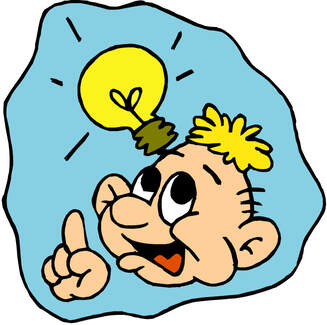 One of the questions most writers get asked is “where do you get your ideas from?”. While it’s a predictable enough question, It’s also one that’s easily answered. Ideas are all around us, we just have to look and listen and then let our imaginations take over. One of my earlier books was “The Girl I Left Behind Me”. The title came first. It’s the last line of the chorus to a traditional song and was used in the soundtrack of three John Ford westerns about the US Cavalry, titled Fort Apache, She Wore A Yellow Ribbon and Rio Grande. For some reason the tune popped into my head one day and I couldn’t shift it. But then it occurred to me that it would make a great title for a book. I quickly Googled it to make sure no one else had had the same idea (they appeared not to have) and then put it into my list of book ideas and let it ferment for a few weeks. 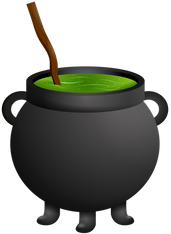 It’s the fermentation that is important here. I had a title but no idea what to do with it, so I let my unconscious mind work on it. I also looked up the origins of the song and found that it was traditional, probably 17th or 18th century British or Irish and had been popular with both sides during the American Civil War. Its rhythm makes it very suitable as a marching song which is why it has come down to us via a military route. Letting that information ferment alongside the title eventually gave me the idea of writing a story set in modern times about two young men who are born just a few streets apart but who go off to war to fight on opposite sides and who leave their "girls" behind them. The story is as much about the two women as it is about the men. I won’t give any more away, just in case you want to read it, but I’m sure you can see that once I had the basics mapped out, writing the story became something that was achievable. Not only that, but one of the characters I created for the book went on to feature in a sequel. 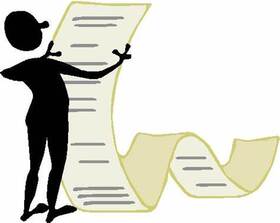 I have an ever-lengthening list of ideas for books that may, or may not, eventually see the light of day and they have come to me by a number of routes. They say that everyone has a book inside of them. American author Jodi Picoult added the rider “the problem is winkling it out” while British writer Christopher Hitchens is credited with adding “and that’s where it should stay”. But it is true. Everyone has a story that can be told, even if they aren’t able to tell it themselves. The problem Hitchens alludes to is making the story interesting enough to make people want to read it, which is the author’s job. For the author the only task in relation to coming up with new book ideas is to keep their eyes and ears open and the story ideas will come. At the moment I’m helping a fellow aspiring author by providing feedback on a book she is writing. I can’t give away the subject as that would be a breach of confidence, but the idea for it is straight off the front pages of the daily newspapers. She was so touched by what she was reading that the idea of not writing a story about it was probably more bizarre than the idea of writing it. 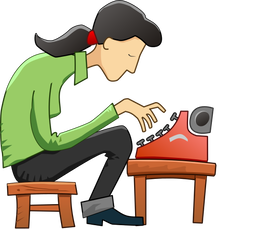 Does that mean that anyone can write a book? Technically yes. If you can write your name you can write a book. However, there is no doubt that some people have an aptitude for it and some don’t. Thanks to the capability to self-publish books that’s available through the digital revolution there are many books that I’ve read in recent years that really shouldn’t have been written, at least not by the people that wrote them. They are living proof of Christopher Hitchens’ corollary. But that doesn’t mean that someone with more aptitude couldn’t write a very good book using the same plot and characters. Do all my ideas become books? Most certainly not. The length of a novel may vary, but generally falls between 80,000 and 120,000 words. I have taken some ideas and barely made it to 10,000 words before I’ve run out of steam. That tells me that, for me, the story just hasn’t got any legs and there’s no point in wasting any more time with it. Of course I don’t delete it. I may have some sudden inspiration that will take it off in a completely new direction, but for the time being it goes into the file marked “not quite as good an idea as I thought”. 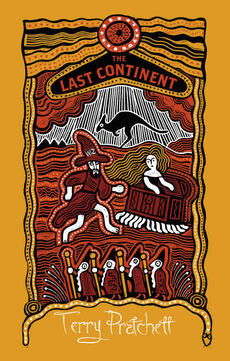 As for suggesting your own book ideas to authors, please don’t. It’s not that they aren’t good ideas, it’s that there are legal implications. Most big-name authors will tell you that at some point they have received letters or emails claiming that the idea for a book was stolen because they (the letter writer) once said or wrote down some of the words that are used in the book. The writer of the letter or email then goes on to try to claim money for suggesting the idea or, even worse, for plagiarism. Terry Pratchett’s agent told me that he received an email threatening legal action from someone who had once suggested, in another email, that Terry Pratchett set one of his books in Australia. The threatening email arrived shortly after the publication of The Last Continent in 2008, where Pratchett sets the story in the country of Fourecks on his imaginary Discworld. Fourecks bore a passing resemblance to the country we call Australia. That was enough for the loony who wrote the email. And that’s why authors would prefer it if you didn’t suggest ideas for books. It’s nothing personal. By the way, if that has given you an idea for making some easy money - forget it! Lawyers are expensive, they are happy to take your case because, win or lose, they will still get paid and proving plagiarism is a very difficult thing to do. If you don't believe me, just ask Sami Okri. So I took my idea that I had pitched to Terry Pratchett’s agent and wrote the book myself. It’s called The Inconvenience Store and is available (here comes the plug) on Amazon. 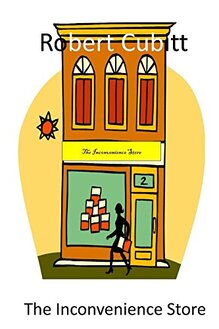 How did I come up with the idea? Easy. I had just been to a convenience store to buy something that they didn’t have on their shelves. When I asked the manager why they didn’t sell it (it was a common enough item) he told me that people often asked for that item, but they didn’t stock it because there was no demand for it. The manager was a totally irony free zone. My response to the manager about his store being more inconvenient than convenient gave me the title for my book and the rest, as they say, is history. So, where is your next book idea coming from? It could be closer than you think. Would you like to be a guest blogger for Selfishgenie Publishing? Just email us and tell us your idea for your blog. The email address can be found on our "Contact" page. If you enjoyed this blog, or found it interesting, be sure not to miss future posts by signing up for our newsletter. We'll even send you a free ebook if you do. Just click the button below.
For the next few weeks we are featuring blogs by guest bloggers on a wide range of subjects related to reading and writing. All the opinions expressed are those of the blogger and are not endorsed by Selfishgenie Publishing. Enjoy! 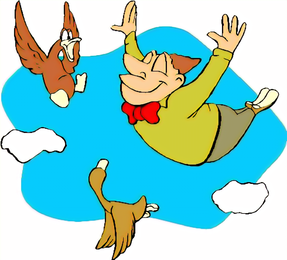 The circus is in town and a wizened little man goes into the big top during rehearsals and approaches the ringmaster. “I’ve got an act and I want to join the circus.” “Ok” says the ring master. “Show me what you’ve got.” So the man goes into the ring and climbs the tent pole all the way to the top. When he gets there he lets go and stretches out his arms and starts to flap them. He then proceeds to fly round the inside of the big top, doing loop the loops and barrel rolls, swooping and soaring, all the time flapping his arms for all he’s worth. After five minutes he settles gently onto the ground in front of the ringmaster once more. “What do you think?” The little man asks. “Is that it? You do bird impressions?” Boom boom. My apologies to the long running TV series M*A*S*H for stealing that joke. But did you laugh at it? If nothing else, it does show you how up to date my TV viewing is these days. 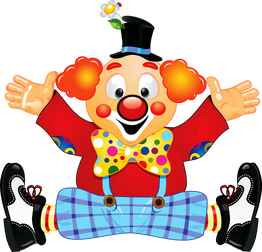 The reason I ask is that comedy in the written word is very hard to do. What one person finds amusing will pass over another person’s head and may be misinterpreted completely. Stand-up comedians spend hours practicing in front of test audiences above pubs and in tiny comedy clubs making sure their material works before they unleash it on their target audience, whether it is in a larger comedy club, at The Edinburgh Fringe or in the 02 arena. A writer doesn’t have that luxury. If he gets it wrong then it could cost him his audience forever. It’s a one-shot deal. The writer may have an editor that may question the suitability of a joke, its comic value, its relevance to the plot and so on. What appeared hilarious when being written in the solitude of the author’s kitchen may fall as flat as a pancake when it reaches the editor’s desk. So what does the writer do? Do they trust to their instinct and go for the laughs, or do they play safe and keep the story serious? Is there room for both? 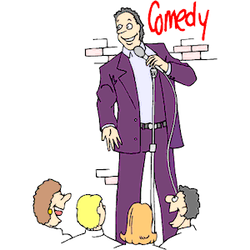 Another problem is that it’s tough to sustain comedy over a long period. A stage comedian works at a rate of two or three laughs a minute. Story telling comedians may string a joke out for three or four minutes before getting to the punchline. So how many jokes does the writer need to put into a story to give it that humorous feel? Is it one per page? One every thousand words? One per chapter? Let’s say it’s the latter. My books generally run out at about 25 chapters. Some have more and some less. At the rate of one significant joke per chapter the sums are easy enough. 25 jokes for a stand-up comedian, therefore, is about ten minutes worth of material. Perhaps half the duration of a comedy club slot. That’s a lot of jokes and every one of them has to hit the mark. Of course, not all the humour in a book has to be in the form of joke. Some of it can be situational. The writer gets a lot of leeway in this area, painting pictures of absurd characters or giving them funny things to do or say. The writer can make his characters do silly things. He can make them stupid to the point of imbecility. He can make them accident prone. He can make them pompous or self-important. But he still has to maintain the humour for over 80,000 words (that’s about the acceptable minimum length for a novel these days). That’s a lot of jokes to have to write. Name one well known writer who is noted mainly for the humour in his novels. Difficult, isn’t it? There are plenty who write short pieces for newspapers and magazines. The now defunct Punch magazine was known for them. But ask them to extend that to a full-blown novel and you would start to see the panic in their eyes. 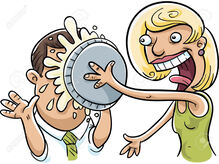 There have been some, of course. Terry Pratchett managed to achieve this in many of his works, but not all of them by any means. The late Keith Waterhouse wrote Billy Liar and I’ve already mentioned M*A*S*H, which made three outings as books for Richard Hooker (real name H. Richard Hornberger). Twelve others in the franchise were ghost written by William E Butterworth and were less critically acclaimed because of it. But when we talk about humorous writing we are often talking about satirical works or parodies, rather than books that are intended solely to be funny. I’ve read a few books recently which, according to their “blurbs” on Amazon, were laugh a minute works. I have to say that they generally failed to make me laugh. The jokes often descended into slapstick and that is a visual media, or it became very juvenile in nature, which is not the sort of comedy that will appeal to an adult reader. More often the jokes were non-existent. So, as someone who likes to introduce a lighter note into my books, that makes me a little bit nervous. What if my readers don’t get the jokes? 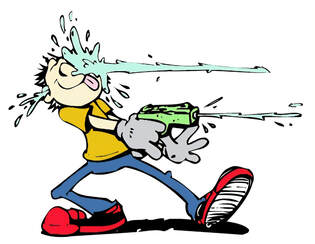 I’ve hedged my bets a bit by not claiming that my books are funny. That way at least I’ll be managing expectations. But that is a double-edged sword. A lot of the time we laugh at jokes because we know they’re jokes and we’re waiting for the punch line. If they were told in a more serious tone of voice with no comedic preamble, would we automatically laugh? Maybe, but maybe not. Like most people I have preferences when it comes to comedy. I laugh at some comedians more readily than I will laugh at others. We all know that humour is a very personal thing, as evidenced by the joke I started with. Some people will have laughed and others won’t. That makes life difficult for an author, because they need to appeal to their entire readership, not just to the few people who will understand their humour. So, humour in a novel is fraught with difficulty, for both the writer and the reader. All I can say is that if you find yourself laughing at my books then the jokes were intended. If you don’t laugh then the book is a serious work of fiction and therefore not the place for me to start telling jokes. Either way I hope you enjoy them. Would you like to be a guest blogger for Selfishgenie? Just email us with your idea for a blog. The address is on our "Contact" page. Did you enjoy this blog, or find it interesting? To be sure of not missing an edition, just sign up to our newsletter. We'll even send you a free eBook for doing it. Just click the button below.
For the next few weeks we are featuring blogs by guest bloggers on a wide range of subjects related to reading and writing. All the opinions expressed are those of the blogger and are not endorsed by Selfishgenie Publishing. Enjoy! 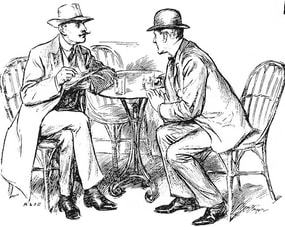 It was one of those conversations that only happen in pubs when drink has been taken. They usually don’t make sense the next day and are quickly forgotten. Well, usually they’re quickly forgotten. The subject was fantasy fiction. You know the sort of thing: wizards, orcs, elves, dragons, enchanted swords etc. My friend said he didn’t read that sort of book because he wasn’t able to suspend his disbelief. I was duty bound to argue against him because… well, because we were in a pub and that’s what blokes do when they’ve had a pint or two. But then, afterwards, I thought about it a little bit more. Why would it not be possible to suspend disbelief and read fantasy fiction? 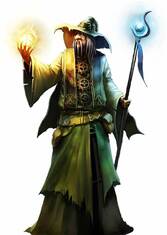 We suspend our disbelief every day of the week over some matter or other, particularly when it comes to the sorts of thing politicians say. So what’s so hard about suspending one’s disbelief over a story that is to be found on the fiction shelves? No one is saying its true (well a few deranged people maybe, but I’m not going to count them). All we fantasy fans are saying is that it’s an escape from the real world and into another. The stories are as valid as they are in any other genre. Indeed, they can be found in genres other than fantasy. They usually take the form of a battle of good against evil, during which quests are undertaken or duties carried out. Honour is high on the agenda, as is bravery, selfless devotion and many other altruistic character traits. Perhaps this is what’s wrong. Perhaps these things are so lacking in our modern world that some people can’t believe that they might exist in any world. There is an old tradition of fantasy fiction, of course, though it isn’t always recognised as such. First, we go all the way back to the Ancient Greeks and Homer’s epic stories in the Iliad and the Odyssey. These may be based on some factual events, but they also contain a lot of fantasy. 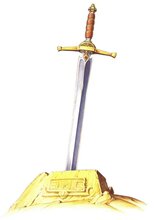 Then we have Arthurian legend. Now, on the surface we have a story about men battling against evil, which forms the core of many a good novel. But we also have a wizard (Merlin), a witch (Morgana), a magical sword in a stone (Excalibur), a mysterious lady in a lake (Viviane or Nimue) and so on. In its basic form it’s no more fantastic than Tolkien. After that we get to the legend of Robin Hood. There is no evidence that he ever existed and what few historical bits of evidence that suggest someone resembling him did exist, don’t portray a picture of the hero of the medieval peasants that robbed from the rich to give to the poor, but a petty criminal who robbed from anyone and kept the loot for himself. OK, more of a legend than a fantasy, but one we buy into. There may be no dragons or orcs, but they’ve been replaced by the Sheriff of Nottingham and his men. We mustn’t forget the Daddy of them all William Shakespeare. In his plays we have a ghost in Hamlet, another one in Macbeth along with three witches, in The Tempest we have a fairy and some sort of troll (Caliban) and of course A Midsummer Night’s Dream which is littered with fairies and in which Bottom is given a pair of donkey’s ears, as though that were normal. 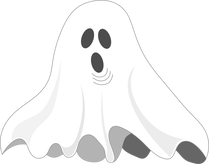 Charles Dickens isn’t averse to using ghosts if it suits his purpose, as he shows in A Christmas Carol, while Bram Stoker gave us Dracula and Mary Shelley provided us with Dr Frankenstein’s hand-built monster. None of these books or plays were aimed specifically at children, which is where my friend thinks the target audience for most fantasy fiction lies. Ghosts, vampires and monsters may be seen as belonging to the horror genre, but they appear in fantasy as well. Now, I’m probably going to upset a few diehard fans here, but I’m going to suggest that the great British Hero James Bond is no more believable as a character than Bilbo Baggins. What is my justification? I hear you ask (I have good hearing). Let’s look at the evidence. Cars that turn into submarines, wristwatches that contain lengths of garrotte wire, cars with ejector seats and so on and so forth. But that’s all boy’s own gadgetry and no more of a fantasy than a sword that glows blue when there are orcs around. At the time when Ian Fleming wrote the stories, the technology for those gadgets didn’t exist, but that didn’t stop him fantasising about them. 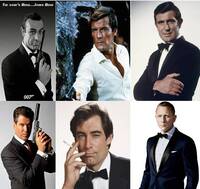 But the real fantasy is Bond himself. A suave, debonair killer who’s also a babe magnet and can get into a fight with half a dozen Kung Fu masters and walk away leaving them in a crumpled heap. He’s been shot so many times he must resemble a colander. He’s fallen from trains, planes and ski slopes. While Ian Fleming and the writers who continued the franchise never claimed magical powers for Bond, does this not require just as much suspension of disbelief as it does to read about Gandalf? Bond may not have “One Ring to rule them all (etc)”, but that was because Q never quite got round to finishing it (But just wait for the next movie – you read it here first). 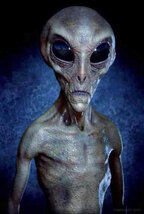 There is, of course, another literary genre that is just as fantastical and requires just as much suspension of disbelief. I mean Sci-Fi. People who will gladly suspend disbelief to accept the premise of strange creatures inhabiting worlds far from our own are sometimes reluctant to do the same for stories containing wizards and dragons. Why? Science does suggest that life may exist on other planets. Indeed, it’s been said that it would be a strange universe if life didn’t exist on other planets. However, science has no idea what form it may take and what its capabilities might be. This is the space that the sci-fi writer inhabits, if you’ll pardon the pun. The space where anything is possible providing the author doesn’t actually ignore the laws of physics. But sci-fi writers do that all the time as well. Time travel, warp speed, sub space, hyperspace, dilithium crystals. Do these sound familiar? Which ones are made up and which does science accept as being possible? No I don’t know either. Dilithium does exist, you can Google it, but can you use it to power a space ship? So, where’s the difference between fantasy and sci-fi? Why is one believable to my friend but the other not? So where do you stand on this issue? Do you read fantasy novels? If not, can you tell me why you don’t? Just comment below. Would you like to be a guest blogger for Selfishgenie? Just email us at our general enquires address, which can be found on our Contact page and tell us what your blog would be about. If you enjoyed this blog, or found it interesting, then be sure not to miss future editions by signing up to our newsletter. We'll even send you a free eBook when you do. Just click the button.
 In a recent blog I made a statement to the effect that there were only 7 basic plots for books. It appears that I was right. Experts think that there are seven basic plots for books. I would throw in an 8th, but I’ll get to that later. The idea was developed by someone called Christopher Booker, who carried out research across a wide selection of books and then published his results in a book (what else) entitled “The Seven Basic Plots: Why We tell Stories”, published in 2004. This was no passing fancy. It took him 34 years to write. Amongst his other credits is that he was one of the founders of Private Eye magazine. He has nothing to do with the Man-Booker Prize which is awarded for literature. 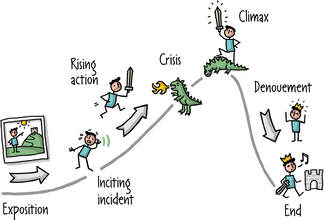 As well as the 7 basic plots, Booker came up with the idea of the meta plot, that is the basic structure which the majority of books follow. This breaks down into four distinct phases. Phase one is the call to action, in which the protagonist is drawn into the adventure to come. Some go willingly, like James Bond, while others, like both Bilbo and Frodo Baggins, go less willingly. Phase two is the frustration stage, where the protagonist struggles against the forces arrayed against him (or her) in order to resolve the problems he is faced with and win the day. During this stage they discover their weaknesses, which they must overcome and also, usually, unexpected strengths. In the nightmare phase all hope is lost and all seems to be doomed. The protagonist may come close to death and is certainly in despair, though quite how this works for plot type 5 (see below) I’m not sure. Finally, we reach the resolution stage, where the protagonist, against all odds, wins the day and earns the title of hero. Again I’m not so sure that this works for plot type 6 (also see below). It doesn’t matter how many other characters there are in the book, it is with the protagonist that the reader’s thoughts and emotions ride. If he or she doesn’t succeed, then the story doesn’t succeed. Even if the protagonist dies at the end, their death must be a sacrifice to gain their success. Do you recognise those four phases from the books you read or write? I must admit that I find it hard to think of any book that doesn’t conform to that pattern So, what are the 7 basic plots that Booker identified? 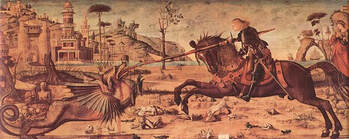 Plot 1. Overcoming the monster. This might be a real monster, such as the Minotaur favoured in Ancient Greek literature, or it may be a figurative one: Big Business, Corrupt Government, Rogue CIA agent, etc. A lot of Greek literature focuses on battling monsters, but it has stood the test of time. H G Wells used it in War Of The Worlds and Michael Crichton in Jurassic Park. The ‘monster’ is also present in stories such as George Orwell’s 1984 and the Jason Bourne and Jack Reacher books. Just because it doesn’t have horns or a tail it doesn’t prevent it being a monster. Plot type 1 is, of course, a staple of the horror story genre: Frankenstein, Dracula, Halloween, Friday The Thirteenth. However, I used it in my World War II series, Carter’s Commandos, where the monster is the Nazi regime in Germany. 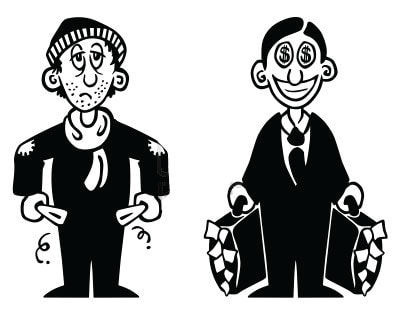 Plot 2. Rags to riches. The most obvious (for me) examples are Dicken’s Great Expectations. Aladdin, The Prince And The Pauper etc. First of all the protagonist comes into great wealth before losing it all and then having their fortunes restored after they have learnt a significant lesson. There is usually a moral to the story, especially around hubris and not abandoning one's real self. 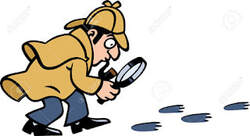 Plot 3. The quest. This is much loved by the writers of fantasy novels and I used it in my Sci-Fi series. With the search for the magic sword, or whatever, also comes personal growth. The protagonist never comes out of a quest unchanged in some way. Its origins are as distant as Homer’s Iliad and progress through history with A Pilgrim’s Progress, Lord Of The Rings, Watership Down, etc.  Plot 4. Voyage and Return. Similar, in some ways, to the quest, the protagonist must leave his home in order to achieve something and, again, returns changed in some way. One of oldest versions of this is Homer’s Odyssey, but perhaps the best known of these is the Lord Of The Rings prequel The Hobbit. Other examples include Gulliver’s Travels and The Wizard of Oz. It is the principal feature of this genre that the protagonist isn’t (necessarily) financially enriched by the journey, but is spiritually enriched. 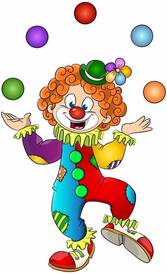 Plot 5. Comedy. Is this really a plot in its own right, I wonder? Comedy can be inserted into almost any plot, even a tragedy if it’s handled correctly. That’s why we refer to “black comedies”. The protagonist is usually a light, cheerful character to whom life frequently hands the dirty end of the stick: a good person to whom bad things happen. However, they stumble along and emerge triumphant at the end, often through luck rather than judgement. Mr Bean or any Norman Wisdom film provides examples. 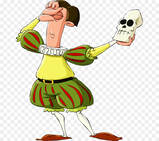 Plot 6. Tragedy. In Ancient Greek theatre this was the partner of comedy as the Greeks only did two types of theatre. Again, I would dispute this being a plot in its own right. Most stories can include a tragedy or two. The protagonist either has a major character flaw which they are unable to identify in themselves or they commit an act for personal gain which has unforeseen consequences and which spirals out of control. Either way it doesn’t end happily. There are many stories that fit this genre: King Lear, Romeo and Juliet, Macbeth, Bonnie and Clyde, Anna Karenina. This isn’t so popular in modern fiction and film as the public prefers a happy ending, so nowadays the inherent tragedy turns to success in the final chapter. While it was always normal for the protagonist to die at the end of a tragedy it is far more normal, now, for them to live. Not only will they live, they will also get the girl (or boy). 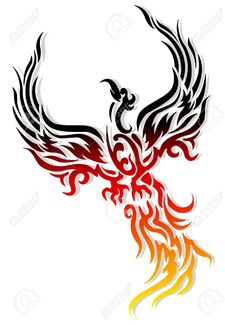 Plot 7. Rebirth. This is the plot for any story in which a villain or an unlikeable character ends up as the hero. It involves the protagonist going through an experience that changes them radically in some way, making them a “new” person. There can also be an element of this in some of the other plots, particularly 3 and 4. Here we find A Christmas Carol (not my alternative version), Beauty And The Beast and Despicable Me. Now we come to my additional plot, Plot 8: Romance. Boy meets girl, boy loses girl for some reason (OK, girl can also lose boy), boy and girl either struggle to get back together, or fight against the inevitable attraction, and finally get back together again at the end of the book (and, of course, there are LGBTQ+ equivalents). This is the territory of Mills and Boon and Barbara Cartland, but has been used by many other authors. In which other genre would Pride And Prejudice fit?  Now, here is the challenge. Can you think of any book that doesn’t fit into one of those 7 (or 8) categories? I have tried and I can’t think of any. If you are an author, have you ever written a book that doesn’t fit into any one of those categories? Would you ever try? An interesting thought is that we might each be living our lives in one of those ways. In other words there are only 8 life stories. That sounds a bit scary, as we all consider ourselves to be unique in some way. However, much as that idea both scares and appeals to me, I have no evidence to back it up so I’ll leave it there. What is of considerable interest to me is this idea of change. The majority of the plot lines described require some form of change to be undergone, in order for there to be a happy ending. This is where the story and real life part company. As a species we aren’t good at changing. If we were we wouldn’t keep repeating the mistakes of the past that lead us into all sorts of messes, up to and including war.  This is where the author often views life through rose tinted spectacles. Their protagonist always undergoes the change, however reluctantly, whatever it is and grows with the experience. In real life this so rarely happens. I’m not saying that it doesn’t happen, because some people really do undergo change, though not always for the better. But for most of us life goes on the same day after day as we curse our bad luck rather than changing our behaviour as a result of experience. So, if there are only 7 (or 8) basic plots for books, why do we keep buying books? After all, once we have read one book from each plot type we have read them all, haven’t we? Well, this is where the skill of the author comes in. He or she makes us believe that their story is both unique and original. "It is the author that makes the difference." Firstly, they will mix and match the plot types to give variation to them. As I suggest above, a quest can also be a journey, and frequently is. Sling in a romance and a bit of personal growth and you tick the boxes of another two types. However, that still limits the number of stories available (Just over 40,000 by my calculation). Yet literally millions of books have been written. It is the author that makes the difference. The skilful author makes you believe, through his or her mix of character and plot, that their story is unique. All the great authors have done this. It is called “finding one’s voice”, in other words saying something different. It is hard to say which authors will find their voice and which will never be heard, because this is down to the reader to judge. But what is clear is that if the reader wishes to find a new voice to listen to they won’t find it by reading what everyone else is reading. A new voice can only come from a new author. If you have enjoyed this blog or found it informative, why not be sure not to miss future editions. Just sign up for our newsletter - and you can get a FREE ebook as well. Just click the button. 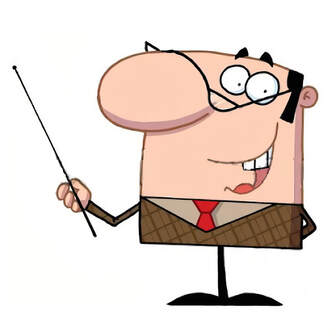 In last week’s blog I featured questions that should never be asked of an author. I received some comments that I was being a trifle sarcastic, harsh even, as people were simply being curious. So, to restore some balance, here are some questions, with my answers, that I don’t mind being asked. I must stress that these are my opinions and other authors may answer these questions differently. When it comes to writing, there are few hard and fast rules, there is only what works for the writer.  1. What is the major challenge for you as an author? Coming up with a fresh approach to a story. Since Homer wrote the Odyssey just about every story there is to tell has been told many times over, so for the modern author there is little they can do except find a new way to tell an old story. There are really only 7 plots for stories, and even then there are similarities and cross overs, so each author has to take one of those seven plots and find a new angle. Perhaps the best modern example is the Harry Potter books by J K Rowling. Stories about wizards are nothing new (Merlin, Gandalf), neither are stories of boarding schools (Billy Bunter, Mallory Towers), but a story about a boarding school for wizards, that was something new.  2. How do you work out your plots? The truth is that I don’t really know. I have an idea for a story and then I start to write. What happens is often as much of a surprise for me as it is, I hope, for the reader. Of course, I have a general idea of where the book is going to end up, but not much of an idea of how it will get there. My Magi sci-fi series is essentially a quest. But quests that go straight from A to B aren’t very interesting. Imagine if Frodo Baggins and Sam Gamgee had gone straight from the Shire to Mount Doom, it would have been a pretty dull story and you would never have heard of J R R Tolkein. So they have many adventures along the way and meet many other characters. The same applies in my Magi series. Each of the nine books is a story in its own right before An Kohli, my protagonist, can complete her quest. If she didn’t it wouldn’t be a series of books, it would be just one very short book. Sometimes I will create a situation and not know why. I don’t worry about it at the time, because I can always edit it out if I don’t need it or it doesn’t work, but I often surprise myself there as well. In “The Warriors: The Girl I Left Behind Me” I introduced a character called Sergeant Major Smith, whose negligence leads to the death of a soldier on a rifle range. I didn’t know why I had done it, but it worked as far as it went. Later in the book, however, I wanted to set up another tragedy and found that I had unwittingly created the character who would enable the tragedy to come about. So, my plots often surprise me as much as they surprise everyone else. 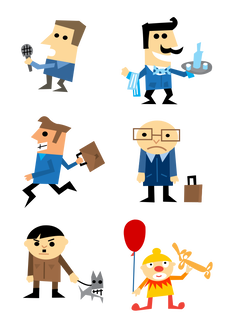 3. How do you create your characters? It’s a bit like building a house. I start with the foundations and work my way up to the roof, before decorating and laying the carpets. The first thing I decide is what sort of a character they are. I don’t like wholly good or wholly bad characters, so I tend to think of them in shades of grey. In The Magi I created a character called Den Gau. He is a bit of a coward, but when the chips are down he surprises himself and everyone else by stepping up to the mark. These are the sorts of characters I find interesting and I hope readers do as well. Next I usually write down a physical description: gender, height, build, hair colour, physical appearance, style of dress etc. That gives me a framework on which to hang everything else. In writing sci-fi this can be fun, because I can let my imagination run wild. Then I need to understand what motivates the character. One of the things I dislike about much modern fiction is that the antagonist, the baddy, is usually such a one dimensional figure in terms of their motivation. We are supposed to believe that they are bad just because we are told that they are bad. I don’t believe that people are born bad, so I have to understand what made them that way. To portray all bankers as being greedy, for example, is as shallow as a puddle in the summertime, so I need to know what made my greedy banker so greedy. After that I will start to layer on some character traits, kindness or cruelty, bravery or cowardice, pride or humility. As with motivation, it isn’t one size fits all. These are polar opposites on discrete axes and most people sit somewhere in between, so it is up to me where along these axes each character sits. For my character of An Kohli I have given her a very strong code of ethics, but if she stuck rigidly to them I wouldn’t be able to make some of the plot work, so I have to let her bend her own rules from time to time. But how far can I let her do that before she fails to be believable as an ethical character? Not everything I have described will make it onto the page, but I have to understand it all if I’m to create believable characters and this is especially true if they are recurring characters in a series of books, because readers who follow the series will expect the characters to remain consistent in their behaviour. We would never accept it of James Bond, for example, if he suddenly started to take bribes to walk away. 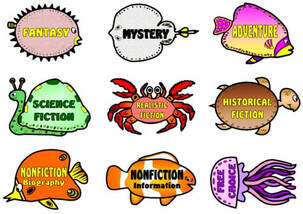 4. Are there any fiction genres you won’t attempt to write? The sorts of books I enjoy writing are the same as I enjoy reading. I’m very much action adventure oriented, so that is what I write. I may locate my stories in outer space, but they are still essentially action adventures. I won’t, therefore, try to write romantic fiction. There is nothing wrong with it as a genre, but I don’t read it and I don’t think I would be good at writing it. The same applies to erotica. Most erotica is actually pretty boring and I’m not sure why it sells so well. For me it sits in the same zone as voyeurism, but without the risk of being arrested for being a peeping tom. I wouldn’t write a western for the simple reason that there is a lot of specialist knowledge required to write it well. Most western fans know their subject inside out and they will spot a faker at a hundred paces. I am a lover of historical fiction but the demands of research for that are considerable. I discovered this when I set out to write a biography of my father’s war service. However, once I had done the research for that, I found I had enough material for a whole series of books set during World War II.  5. How do you go about editing your books? Any mother will tell you that there is no such thing as an ugly baby and writers feel much the same about their books. To go back and try to judge a book for oneself after taking between 3 to 6 months to write it is very difficult, but it must be done. Any author who is struggling to find a publisher is probably struggling because they haven’t been critical enough in their editing. I start with the simple things: typos, spelling, punctuation and grammar. I won’t get everything right even then. You can spot a self-published book from a hundred miles because it will be littered with simple errors that the author failed to spot. The next step is to take each scene of the book and try to assess whether it really works. This is the difficult part, because self-criticism is so hard. Some authors go the other way and slash and burn their manuscripts, practically destroying the book and having to go back and pretty much re-write the whole story. To avoid this, I do an initial critical edit of each chapter after I complete it, so I’m not wasting lots of time. There are two critical elements I try to eradicate. The first is “show vs tell”. Think of this as the difference between watching a football match live and listening to a match summary from Chris Kamara. In “show” the author paints a picture of what is happening within the story, so that the reader can visualise it. But with “tell” the author is merely presenting a report of what happened. It is the most common criticism levelled against first time authors and again, self-published authors suffer the most from the affliction. "it is essential to get an independent person to read the book " My final edit is always of dialogue. I try to write conversations the way people actually speak, because that is going to be the most authentic, so it is important to play those conversations back in my head, to make sure I have achieved that goal. I sometimes find that I have gone off on long lectures, which isn’t something that is allowed to happen in real life because the listener usually interrupts or falls asleep. There is an exception to that. My Carter’s Commando novels often feature military briefings and these provide a way of providing a lot of background material behind the historical context of the story I am telling. However, real life briefings rarely contain so much detail. They focus more on what is going to happen, rather than what has gone before. After that the manuscript goes off to my publisher for more editing. That is much more revealing as it is a fresh pair of eyes that is interpreting what has been written. So, if someone can’t take criticism, it’s best for them not to become a writer. If you want to self-publish then it is essential to get an independent person (or better still – people) to read the book and provide honest feedback before publication. Friends and family aren’t a good choice, because they want to be kind, which is no help at all. 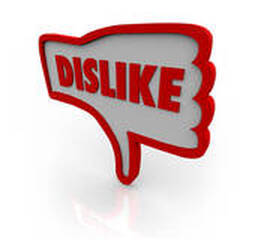 6. What do you think about bad reviews? If you can’t take criticism, then it’s best not to read reviews because they aren’t all going to be good. And our friends the internet trolls aren’t above leaving terrible reviews for books they have never read. Not everyone will enjoy a book and if someone doesn’t enjoy it then their opinion is as valid as those that did enjoy it. Some bad reviews can be very helpful. If several people are saying the same thing it is worth paying attention and trying to fix the problem. The worst reviews are those that don’t tell the author anything. Saying “I hated this book” isn’t helpful, but saying “I hated this book because….” can be. If you are a reader and you enjoy a book, please do submit a review. Sharing your pleasure helps the author. It doesn’t have to be fancy; a simple “I enjoyed this book” is as good as a 500 word essay. If you enjoy the food at a particular restaurant you tell your friends, don’t you? So why not tell your friends about books you have enjoyed?  7. What advice would you give someone who wants to become an author? Don’t do it for the money. You are likely to end up poor. Hundreds of thousands of footballers play in the amateur leagues, but only a couple of hundred footballers get paid thousands of pounds a week to play in the Premier League. The same applies to authors. About 99% of authors, even those published by the big publishing houses, earn less than the national average wage. Each year a couple of new names hit the big time, but they are a tiny fraction of the total number of people who write books. So if you love writing by all means become a writer, but do it for the love of it. Anything else is a bonus. Secondly, don’t assume that because people say nice things about your books it means you are a good writer. Friends and family don’t want to hurt your feelings, so they say nice things. The only real way to find out if you are talented is to get your books read by strangers. They will tell you the truth, and sometimes the truth hurts. 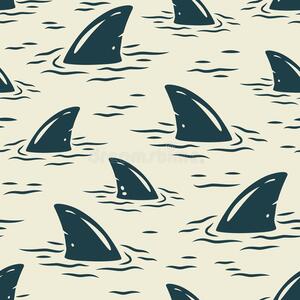 There are a lot of sharks in the publishing world trying to make money off the backs of authors, so: (1) Don’t pay publishers to publish you; they are supposed to pay you from your sales. (2) Don’t pay people to publicise your book. If your publisher isn’t doing that for you, what is he (or she) doing to earn their share of the income? Especially don’t pay those people who just Tweet your book title. They don’t produce sales. (3) There are some things worth paying for: (a) a professional critique of your work and (b) a good cover design, but look for references before committing yourself. Finally, just because your books don’t sell it doesn’t mean that your books aren’t good. Publishing is a very crowded marketplace, well over a million new books are published every year. It takes a lot to get noticed and some people never will be, no matter how good their books are. So, once again, do it for the love of it. If you have enjoyed this blog, ot found it informative, be sure not to miss any future posts by signing up for our newsletter. you can even get a FREE ebook just for doing it. Click the button below to find out how. |
AuthorThis blog is compiled and curated by the Selfishgenie publishing team. Archives
June 2025
|
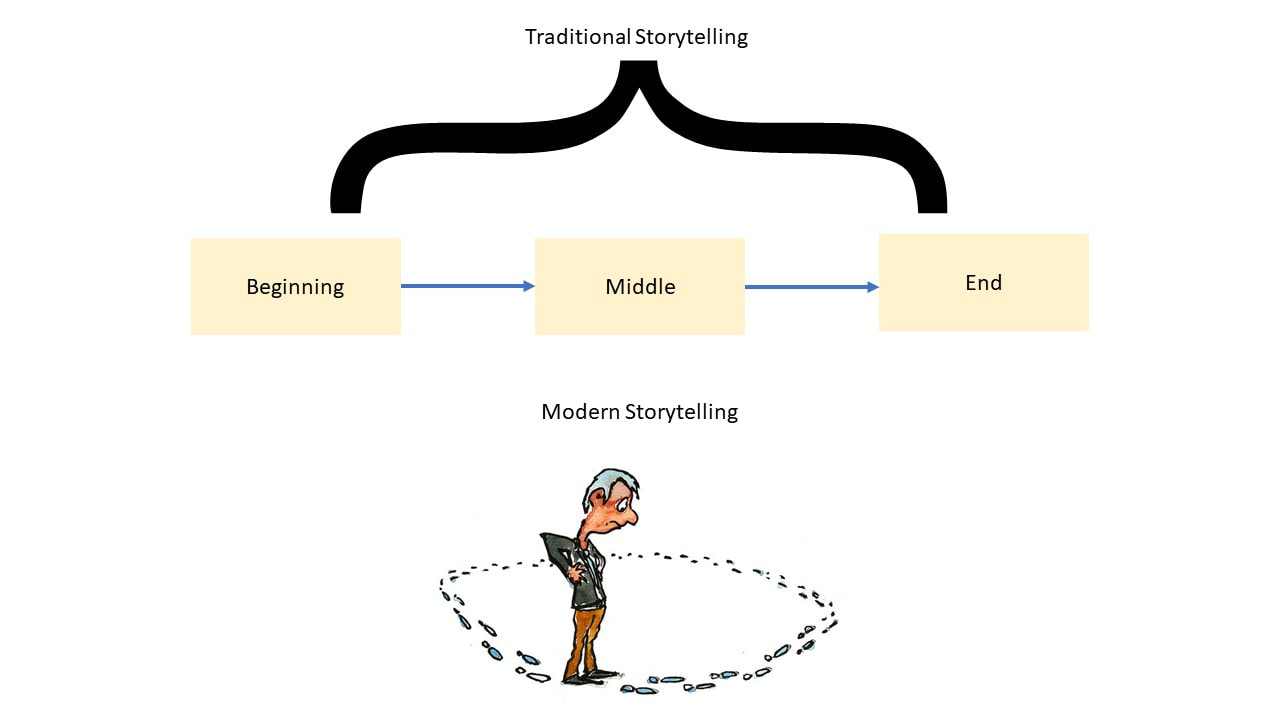
 RSS Feed
RSS Feed